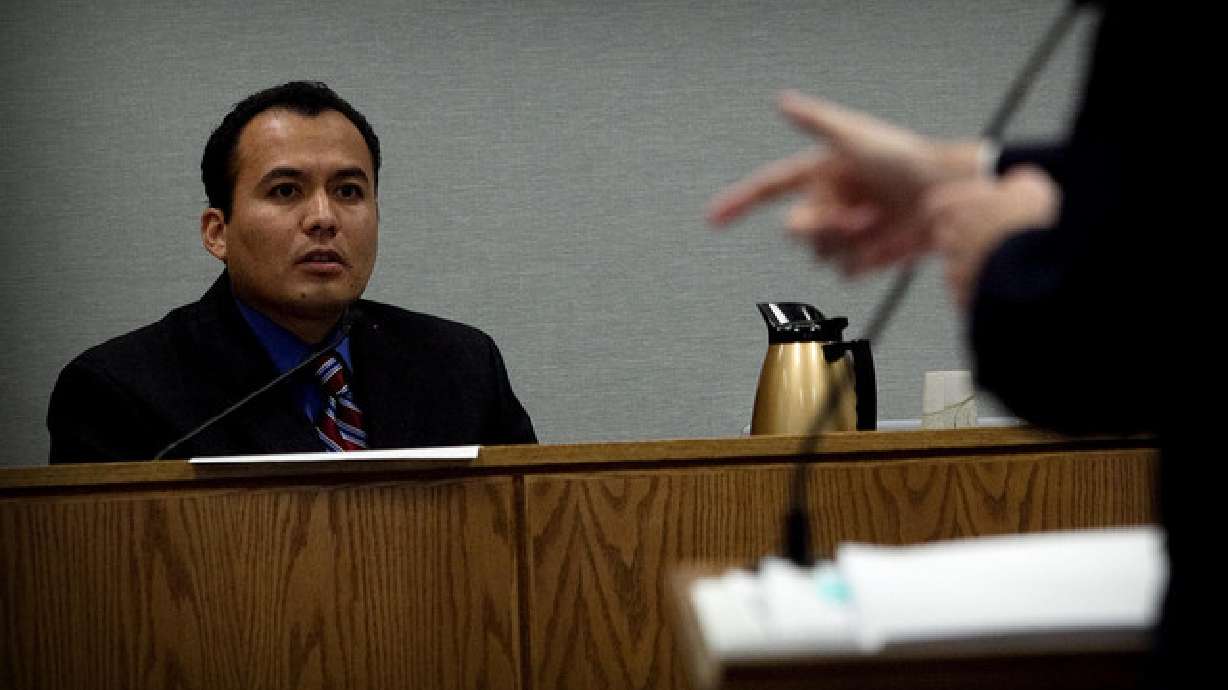Estimated read time: 3-4 minutes
This archived news story is available only for your personal, non-commercial use. Information in the story may be outdated or superseded by additional information. Reading or replaying the story in its archived form does not constitute a republication of the story.
PROVO — The question of what led Ramon Somoza — a University of Southern California grad and budding entrepreneur — to shoot and kill a man he apparently once considered a "father figure" went to a jury Friday.
And after four hours of deliberation, the five-man, three-woman jury sided with prosecutors, finding Somoza, 30, of American Fork, guilty of murder, a first-degree felony, in connection with the Dec. 28, 2009, slaying of 46-year-old Jesus Landin.
They also found Somoza guilty on counts of obstructing justice, a second-degree felony, and abuse or desecration of a dead human body, a third-degree felony.
"We're very happy with the verdict," prosecutor Chad Grunander told the Deseret News. "We had a great jury, a conscientious jury, they worked hard, took a lot of notes and were very patient during a 3 1/2 week trial."
"His acts after the shooting only prove he freaked out," Gonzales said. "After the shooting, Ramon was worried no one would believe him. There were no witnesses. He panicked."
In closing arguments Friday, attorneys presented conflicting accounts of the fight that left Landin dead with five bullet wounds in his body. Prosecutor Chad Grunander said Somoza, who owns the Apollo dance hall, shot his former employee in cold blood and it was "nothing short of an execution."
"Nothing gave Mr. Somoza the right to kill," Grunander said. "Nothing gave him the right to be judge, juror and executor and that's exactly what he did."
Somoza told a man who lived at the dance hall to "go far away" the night Somoza was to meet with Landin to settle a debt over $400 in unpaid wages, Grunander said, even though Somoza was afraid of Landin to the point that he started carrying a gun.
The prosecutor questioned why Somoza would meet Landin alone, in a basement room with no windows.
"Jesus was a persistent problem for (Somoza)," Grunander said. "(Landin) was a thorn in his side."
He further questioned what happened after the killing as Landin's body was discovered Jan. 7 near Wendover by local ranchers. It was wrapped in plastic garbage bags and duct tape. A white shower curtain had been placed over it to try and camouflage it in the snow.

"Innocent people do not take the steps (Somoza) did to conceal a killing — to destroy evidence, to package up a body."
Defense attorney Barbara Gonzales said that what her client did was "wrong," but it did not prove he was a murderer or that he had a master plan.
"His acts after the shooting only prove he freaked out," Gonzales said. "After the shooting, Ramon was worried no one would believe him. There were no witnesses. He panicked."
She reiterated time and time again that Somoza shot Landin in self-defense, only after Landin came after him with a screwdriver.
She said Somoza is a "good" and "peaceful" man while Landin had a history of violence.
"Jesus was aggressive, a bully," Gonzales said, pointing to a witness who testified Landin assaulted her. "Jesus exhibited that same pattern of aggressiveness with Ramon."
She said her client wasn't obligated to flee from a combative Landin and that Somoza was justified, under the law, in defending himself.
"Ramon intentionally fired the weapon, but he did it in self-defense," she said.
"Self-defense is a complete defense to the charge of murder."
Despite the opposing theories, Grunander said he was always confident in the case and the charges that were filed.
"It was a strong case from the get-go," Grunander said. "We're glad the jury saw our side and got to the truth."
When Somoza is sentenced in October, he faces a possible sentence of 15 years to life to life in prison on the murder charge, with possible sentences of one to 15 years in prison and zero to five years in prison on the obstruction of justice and desecration of a body charges, respectively.
Email:emorgan@ksl.com









